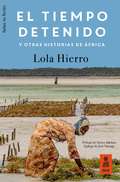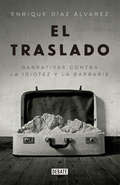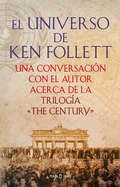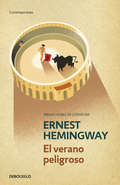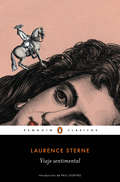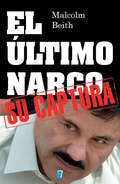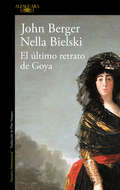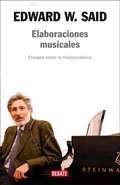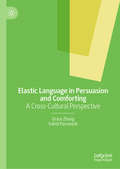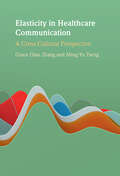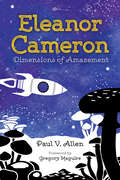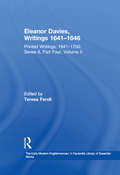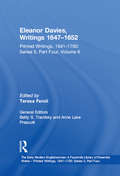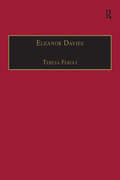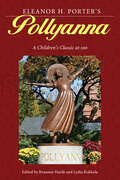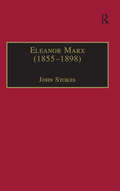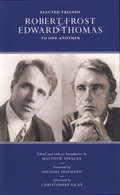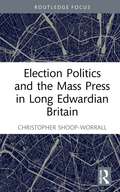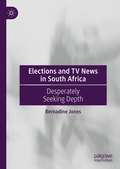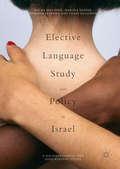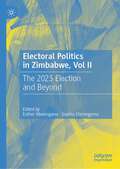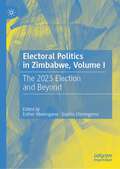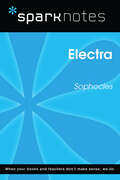- Table View
- List View
El tiempo detenido y otras historias de África
by Lola HierroPrólogo de Xavier AldekoaEpílogo de José Naranjo Una mirada fascinante al continente africano para descubrir vidas, culturas, tradiciones, sabores y olores, que invitan al lector a inventar su propia África. Gracias a su trabajo como reportera, Lola Hierro ha conocido la esperanza de igualdad de las mujeres en Etiopía; ha dormido junto a hipopótamos en Kenia; ha admirado el trabajo de las campesinas del mar en Tanzania; ha saboreado el café preparado a la manera tradicional en Uganda; ha sido alumna de la maestra Doussou Fané en Malí; ha sido testigo de las duras condiciones de vida de los refugiados en Níger; ha comprobado la resistencia de los bosquimanos en Botsuana; ha abrazado el mar y el desierto en Namibia, y ha sobrevivido a las indómitas aguas del río Zambeze en Zimbaue. Una invitación a viajar en un matatu particular y observar la forma de vida y los cambios que se producen en un vastísimo territorio en el que, en palabras de la autora, «el tiempo se detiene ante nuestros ojos, sí, pero como la noria que para un momento y permite que nos subamos antes de empezar a girar y llevarnos al cielo».
El traslado: Narrativas contra la idiotez y la barbarie
by Enrique Díaz ÁlvarezEnrique Díaz Álvarez invita a los lectores a prestar atención a aquellas narrativas que nos sensibilizan contra el abuso de poder, el racismo, el fanatismo, el dolor de los demás. Un ensayo cuyo punto de partida son los flujos migratorios actuales como espacio ejemplar para analizar las formas de luchar contra el fanatismo y la apatía de las sociedades contemporáneas. Nada es más frecuente en las sociedades contemporáneas que el miedo y la indiferencia hacia lo extraño. Parecemos incapaces de desechar los prejuicios que impiden cuestionar los relatos discriminatorios que nos separan. Sin duda, buena parte de la decadencia de la vida pública tiene raíz en la poca disposición para ponernos en el lugar del otro. "Un acto de hospitalidad no puede ser sino poético", dice Jacques Derrida en el epígrafe de este libro, cuyo punto de partida es una premisa fundamental: la imaginación es un acto de resistencia política en tanto que suscita el traslado, esto es, la posibilidad de experimentar significativamente la vida de los otros. Hay que tener en cuenta este poder para hospedar e implicarnos con cuerpos e historias ajenas si queremos combatir la barbarie y esa idiotez que nos aísla de lo público. La propuesta de esta obra es decisiva: para revertir algo del descrédito de la política debe prestarse atención a aquellas narrativas que nos sensibilizan contra el abuso de poder, el racismo, el fanatismo, el dolor de los demás. La vida en común nos exige cultivar ese simulacro que revela la individualidad y las condiciones sociales de personas con otra ideología, religión o cultura. Otros autores han opinado: "De Enrique Díaz Álvarez cabía esperar este paso: hábil montador de historias en el cine, se ha trasladado al ensayo y propone una literatura de resistencia ante los discursos invasores. Un libro muy sugerente, creativo, absolutamente recomendable." - Enrique Vila-Matas.
El traslado: Narrativas contra la idiotez y la barbarie
by Enrique Díaz ÁlvarezEnrique Díaz Álvarez invita a los lectores a prestar atención a aquellas narrativas que nos sensibilizan contra el abuso de poder, el racismo, el fanatismo, el dolor de los demás. Un ensayo cuyo punto de partida son los flujos migratorios actuales como espacio ejemplar para analizar las formas de luchar contra el fanatismo y la apatía de las sociedades contemporáneas. Nada es más frecuente en las sociedades contemporáneas que el miedo y la indiferencia hacia lo extraño. Parecemos incapaces de desechar los prejuicios que impiden cuestionar los relatos discriminatorios que nos separan. Sin duda, buena parte de la decadencia de la vida pública tiene raíz en la poca disposición para ponernos en el lugar del otro. "Un acto de hospitalidad no puede ser sino poético", dice Jacques Derrida en el epígrafe de este libro, cuyo punto de partida es una premisa fundamental: la imaginación es un acto de resistencia política en tanto que suscita el traslado, esto es, la posibilidad de experimentar significativamente la vida de los otros. Hay que tener en cuenta este poder para hospedar e implicarnos con cuerpos e historias ajenas si queremos combatir la barbarie y esa idiotez que nos aísla de lo público. La propuesta de esta obra es decisiva: para revertir algo del descrédito de la política debe prestarse atención a aquellas narrativas que nos sensibilizan contra el abuso de poder, el racismo, el fanatismo, el dolor de los demás. La vida en común nos exige cultivar ese simulacro que revela la individualidad y las condiciones sociales de personas con otra ideología, religión o cultura. Otros autores han opinado: "De Enrique Díaz Álvarez cabía esperar este paso: hábil montador de historias en el cine, se ha trasladado al ensayo y propone una literatura de resistencia ante los discursos invasores. Un libro muy sugerente, creativo, absolutamente recomendable." - Enrique Vila-Matas. "De Enrique Díaz Álvarez cabía esperar este paso: hábil montador de historias en el cine, se ha trasladado al ensayo y propone una literatura de resistencia ante los discursos invasores. Un libro muy sugerente, creativo, absolutamente recomendable." - Enrique Vila-Matas.
El universo de Ken Follett
by Ken FolletteBook gratuito con material inédito sobre la trilogía de Ken Follet «The Century» Este eBook contiene material extra sobre la aclamada trilogía de Ken Follett «The Century»: entrevistas y conversaciones con el autor, vídeos y material inédito sobre las familias protagonistas, etc. La trilogía «The Century» está compuesta por La caída de los gigantes, El invierno del mundo y El umbral de la eternidad, y sigue los destinos entrelazados de tres generaciones de cinco familias: una galesa, una inglesa, una rusa, una alemana y otra estadounidense, de modo que permite contemplar, en primera persona, una de las épocas posiblemente más convulsas, violentas y determinantes de la historia. Una combinación épica de drama humano, sello distintivo en las obras de Ken Follett.
El verano peligroso (Documento Ser.)
by Ernest HemingwayUn complejo y profundo autorretrato que desvela las cualidades que el Premio Nobel de Literatura Ernest Hemingway tiene en común con los mejores creadores del siglo XX. En 1959 Hemingway regresó a España para cumplir un encargo de la revista Life: escribir un artículo, ilustrado por fotógrafos de la talla de Burrows y Hotchner, sobre el duelo entre dos grandes toreros: Antonio Ordóñez y Luis Miguel Dominguín. A sus sesenta años y sufriendo los trastornos psicológicos que le empujarían a la muerte, el autor se reencontró con las imágenes que le habían cautivado en su juventud y de las cuales surgió El verano peligroso, un libro que contiene momentos del más puro Hemingway, donde lo que se sugiere cobra mayor importancia que lo que está escrito. Reseña:«Hemingway fue un entusiasta de la existencia y ese entusiasmo brilla en sus páginas.»Miguel Sánchez Ostiz
El viaje sentimental
by Laurence SterneLos mejores libros jamás escritos. «Soy muy consciente, al mismo tiempo, de que tanto mis viajes como mis observaciones serán de una formulación diametralmente distinta a la de mis precursores.» Un alegre clérigo, llamado Yorick, alter ego del autor, lleva a cabo un recorrido sentimental por Francia e Italia, en el que no son tan importantes los paisajes o las ciudades como las mujeres, las gentes, las aventuras, las sensaciones, el ingenio y el humor. Sterne, uno de los más brillantes fundadores de la novela inglesa, alumbra en este clásico una obra iniciática y seminal, referente ineludible para todos los grandes escritores modernos. La presente edición viene precedida por la introducción de Paul Goring, catedrático en la Universidad Noruega de Ciencia y Tecnología, y reconocido experto en la obra de Laurence Sterne. Asimismo, la delicada mano de Verónica Canales Medina ha vertido este gran clásico inglés a nuestra lengua. Friedrich Nietzsche dijo...«El escritor más libre de todos los tiempos.»
El último narco: su captura
by Carla MonteroUna fascinante historia de corrupción, feudos sangrientos y negociaciones de vida y muerte. México, febrero de 2014. Los titulares de prensa informan sobre la captura de "El Chapo" ¿Quién hizo la última jugada? El zar de las drogas fue el segundo fugitivo más buscado en el mundo, después de Osama Bin Laden. Lo fue desde que se escapó de prisión en 2001, luego de sobornar guardias para que lo condujeran afuera en un carrito de lavandería.El cartel del Chapo mueve miles de toneladas de cocaína, marihuana y heroína hacia Estados Unidos cada ano por medio de túneles, aviones y submarinos. Ha ganado miles de millones de dólares, y su nombre apareció en la Lista de Poder Global de la revista Forbes en 2009. Mata policías, soldados y aquellos que lo traicionan. Sus coterráneos lo consideran un héroe del pueblo. ¿Qué hay detrás de este personaje? ¿Cómo se consiguió la captura?
El último retrato de Goya
by John Berger Nella BielskiEl último retrato de Goya está inspirado en diversos episodios de la vida del artista, en una época de agitación política y guerras patrióticas. Durante el largo periodo de caos que marcó en España el salto de siglos entre el XVIII y el XIX, en una época de agitación política y guerras patrióticas, Francisco de Goya tuvo que ganarse la vida como pintor de Corte, haciendo retratos de familia real y de la aristocracia. Pero su retrato más importante quizá no sea ninguno de ellos, sino el fenomenal retablo que integran sus dibujos y grabados, hasta pintar el rostro monstruoso y revuelto de su tiempo. El último retrato de Goya está inspirado en diversos episodios de la vida del artista. Es, por así decirlo, una serie de diálogos de alto contenido iconográfico, la antítesis de una «comedia de época». Los autores, dando réplica al genio inventivo y a la tremenda expresividad de Goya, trazan una semblanza del pintor que nos lo sitúa en su tiempo sin dejar de presentárnoslo como un hombre que nos habla desde el presente, como si hubiera conocido nuestros problemas actuales, como si hubiera pintado el futuro.
Elaboraciones musicales: Ensayos sobre la música clásica
by Edward W. SaidEnsayo sobre música y sociedad, meditación sobre diferentes movimientos artísticos y sus influencias, Elaboraciones musicales es una invitación a comprender la música clásica y una aproximación, de la mano de un maestro, a entender la creación como expresión de lo real. Considerada una de las grandes creaciones intelectuales de la humanidad, la música es un rico lenguaje artístico que expresa deseos y anhelos al tiempo que refleja las condiciones materiales y el contexto cultural en el cual se concibe. Esta es una de las conclusiones que se desprenden de la lectura de esta penetrante obra, unos brillantes textos que centran su atención en la música clásica occidental. En esta reflexión sobre la música como disciplina humanística y sus procesos de elaboración, el profesor Said propone un análisis amplio de las partituras, los músicos y sus épocas, una mirada que englobe todos los elementos posibles, de la misma manera que el lector o el crítico hacen a la hora de enfrentarse a un texto literario o una obra de arte. Beethoven y la Ilustración o Wagner y la filosofía de Schopenhauer, por citar solo dos ejemplos, son algunos de los casos estudiados, cruciales momentos históricos que muestran con claridad cómo las relaciones entre la música y su entorno son indiscutibles.
Elastic Language
by Grace Q. ZhangElastic language carries non-specific and stretchable meaning, as in 'He loves her, kind of'. It is used like a slingshot, targeting various strategic goals. Consolidating current research and charting new directions, this book develops a refreshing theory of elasticity, empirically attested by natural language data from tension-prone encounters between Australian Customs officers and passengers. The theory proposes three principles (fluidity, stretchability and strategy) and offers a systematic look at how elastic language, as a sliding scale, works to balance strengthening and weakening speech tones, to firm and soften a speaker's stance, and to reveal and evade the truth. The comparative analysis of forms, functions, and context confirms that elastic language is fluid, stretchable, and strategic. It serves both cooperative and competitive functions, and social and speech factors impact on its use. This book will appeal to students and researchers working in pragmatics, applied linguistics, sociolinguistics, discourse analysis, and communication.
Elastic Language in Persuasion and Comforting: A Cross-Cultural Perspective
by Grace Zhang Vahid ParvareshThis innovative book examines the discourse of reality television, and the elasticity of language in the popular talent show The Voice from a cross-cultural perspective. Analysing how and why elastic language is used in persuasion and comforting, a comparison between Chinese and English is made, and the authors highlight the special role that elastic language plays in effective interactions and strategic communication. Through the lens of the language variance of two of the world’s most commonly spoken languages, the insights and resources provided by this book are expected to advance knowledge in the fields of contrastive pragmatics and cross-cultural communication, and inform strategies in bridging different cultures. This study highlights the need to give the elastic use of language the attention it deserves, and reveals how language is non-discrete and strategically stretchable. This book will be of interest to academics and postgraduate students engaged in elastic/vague language studies, cross-cultural pragmatics, media linguistics, discourse analysis, sociolinguistics and communication studies.
Elasticity in Healthcare Communication: A Cross-Cultural Perspective
by Grace Qiao Zhang Ming-Yu TsengElastic language is a phenomenon in linguistics that refers to how we stretch the meanings of words, depending on the context in which they are used – for example many, about 20, perhaps, could be. This study looks specifically at elastic language in the fields of medicine and healthcare, showing how it is used to serve both the patient's and the professional's needs. It explores the pragmatics and metapragmatics of elasticity in the delivery of online medical information as a way of avoiding miscommunication. Based on data from Chinese and English sources, it takes a cross-cultural perspective, to present an account of harmony and disharmony between professional medical websites and their users. Adding exciting new dimensions to the fields of health communication and pragmatics, it is essential reading for scholars and advanced students in semantics, pragmatics, discourse analysis and interactional linguistics, as well as professionals involved in healthcare and communication.
Eleanor Cameron: Dimensions of Amazement
by Paul V. AllenEleanor Cameron (1912-1996) was an innovative and genre-defying author of children's fiction and children's literature criticism. From her beginnings as a librarian, Cameron went on to become a prominent and respected voice in children's literature, writing one of the most beloved children's science fiction novels of all time, The Wonderful Flight to the Mushroom Planet, and later winning the National Book Award for her time fantasy The Court of the Stone Children.In addition, Eleanor Cameron played an often vocal role in critical debates about children's literature. She was one of the first authors to take up literary criticism of children's novels and published two influential books of criticism, including The Green and Burning Tree. One of Cameron's most notable acts of criticism came in 1973, when she wrote a scathing critique of Roald Dahl's Charlie and the Chocolate Factory. Dahl responded in kind, and the result was a fiery imbroglio within the pages of the Horn Book Magazine. Yet despite her many accomplishments, most of Cameron's books went out of print by the end of her life, and her star faded.This biography aims to reinsert Cameron into the conversation by taking an in-depth look at her tumultuous early life in Ohio and California, her unforgettably forceful personality and criticism, and her graceful, heartfelt novels. The biography includes detailed analysis of the creative process behind each of her published works and how Cameron's feminism, environmentalism, and strong sense of ethics are reflected in and represented by her writings. Drawn from over twenty interviews, thousands of letters, and several unpublished manuscripts in her personal papers, Eleanor Cameron is a tour of the most exciting and creative periods of American children's literature through the experience of one of its valiant purveyors and champions.
Eleanor Davies, Writings 1641–1646: Printed Writings, 1641–1700: Series II, Part Four, Volume 5 (The Early Modern Englishwoman: A Facsimile Library of Essential Works & Printed Writings, 1641-1700: Series II, Part Four)
by Teresa FeroliIn 1625 Lady Eleanor Davies' life took a dramatic turn when, by her account in 1641, a "Heavenly voice" told her "There is Ninteene yeares and a halfe to the day of Judgement, and you as the meek Virgin". That same year she published her first treatise, A Warning to the Dragon, initiating her controversial career as a writer of prophetic tracts. Between 1641 and 1652 she would produce some 66 of them, using the Bible to gauge the cosmic significance of events, great and small, taking place in her nation and in her personal life. They focus on a complex of personal and political events that Lady Eleanor thought indicated the fast approach of the "last days" foretold by the biblical prophets Daniel and John of Patmos. A complement to Teresa Feroli's facsimile edition of Eleanor Davies' pre-1640 texts (Ashgate, 2000), this pair of volumes reproduces 60 texts from the corpus of 66 printed between 1641 and 1652.
Eleanor Davies, Writings 1647–1652: Printed Writings, 1641–1700: Series II, Part Four, Volume 6 (The Early Modern Englishwoman: A Facsimile Library of Essential Works & Printed Writings, 1641-1700: Series II, Part Four)
by Teresa FeroliIn 1625 Lady Eleanor Davies' life took a dramatic turn when, by her account in 1641, a "Heavenly voice" told her "There is Ninteene yeares and a halfe to the day of Judgement, and you as the meek Virgin". That same year she published her first treatise, A Warning to the Dragon, initiating her controversial career as a writer of prophetic tracts. Between 1641 and 1652 she would produce some 66 of them, using the Bible to gauge the cosmic significance of events, great and small, taking place in her nation and in her personal life. They focus on a complex of personal and political events that Lady Eleanor thought indicated the fast approach of the "last days" foretold by the biblical prophets Daniel and John of Patmos. A complement to Teresa Feroli's facsimile edition of Eleanor Davies' pre-1640 texts (Ashgate, 2000), this pair of volumes reproduces 60 texts from the corpus of 66 printed between 1641 and 1652.
Eleanor Davies: Printed Writings 1500–1640: Series I, Part Two, Volume 3 (The Early Modern Englishwoman: A Facsimile Library of Essential Works & Printed Writings, 1500-1640: Series I, Part Two #Vol. 3)
by Teresa FeroliLittle is known of the upbringing of Lady Eleanor Davies, what is known is that her life was mired in both flamboyant personal conflict and in the notoriety of the Castlehaven scandal (resulting in the execution of her brother), and that her writings were embroiled in political affairs. Married in 1609 to Sir John Davies, her husband tried to discourage her prophetic writing and burned her early treatises. Her second husband, Sir Archibald Douglas was equally critical. Once free from the censorship of her husbands, her prophetic career spanned the years between 1625 and 1652. During that time she published some 69 treatises, spent years in prison, and some time in Bedlam, and made astonishing predictions on a wide range of subjects. Viewed as both an inspired seer and a mad ’ladie’ by her contemporaries, Lady Eleanor has received a great deal of scholarly attention, not least of all because of her densely allusive and complex prose style. Reproduced here is the 1625 treatise A Warning to the Dragon and all his Angels which is a classic example of the kind of apocalyptic writing that predominates in late-sixteenth- and early-seventeenth-century England. All the kings of the earth shall prayse thee (1633) is one of three texts that Lady Eleanor had printed in Amsterdam and is an exegetical treatise on the visions of Daniel. Woe to the House (1633) is the first of Lady Eleanor’s four treatises that defended the innocence of her brother, Mervin Touchet.
Eleanor H. Porter's Pollyanna: A Children's Classic at 100 (Children's Literature Association Series)
by Roxanne Harde and Lydia KokkolaAppearing first as a weekly serial in The Christian Herald, Eleanor H. Porter's Pollyanna was first published in book form in 1913. This popular story of an impoverished orphan girl who travels from America's western frontier to live with her wealthy maternal Aunt Polly in the fictional east coast town of Beldingsville went through forty-seven printings in seven years and remains in print today in its original version, as well as in various translations and adaptations. The story's enduring appeal lies in Pollyanna's sunny personality and in her glad game, her playful attempt to accentuate the positive in every situation. In celebration of its centenary, this collection of thirteen original essays examines a wide variety of the novel's themes and concerns, as well as adaptations in film, manga, and translation. In this edited collection on Pollyanna, internationally respected and emerging scholars of children's literature consider Porter's work from modern critical perspectives. Contributors focus primarily on the novel itself but also examine Porter's sequel, Pollyanna Grows Up, and the various film versions and translations of the novel. With backgrounds in children's literature, cultural and film studies, philosophy, and religious studies, these scholars extend critical thinking about Porter's work beyond the thematic readings that have dominated previous scholarship. In doing so, the authors approach the novel from theoretical perspectives that examine what happens when Pollyanna engages with the world around her—her community and the natural environment—exposing the implicit philosophical, religious, and nationalist ideologies of the era in which Pollyanna was written. The final section is devoted to studies of adaptations of Porter's protagonist.
Eleanor Marx: Life, Work, Contacts (The Nineteenth Century Series)
by John StokesKarl Marx's youngest daughter Eleanor (1855-98) is one of the most significant figures in the cultural politics of the late nineteenth century. As a feminist and radical socialist she never flinched from confrontation; as an aspiring actress, working journalist and literary translator she advanced contemporary understanding of Flaubert, Ibsen and Shakespeare. This collection of newly commissioned essays helps to establish the full extent of her outstanding achievements.
Elected Friends
by Michael Hoffman Christopher Ricks Matthew SpencerRobert Frost and Edward Thomas met in a bookshop in London in 1913. During the next four years, the two writers--Frost, an unknown poet who had sold his farm in New Hampshire in order to take his family to England for one last gamble on poetry and Thomas, a sad literary journalist--formed the most important friendship between poets since that of Wordsworth and Coleridge. Their friendship only ended with Thomas' death in Arras, France, a casualty of the First World War. The story of Edward Thomas' turn to poetry, in fact, has been dominated by the account of Robert Frost's injunction: to break his existing prose into lines, bringing his musical cadence and his direct speaking voice into conversation with formal prosody. Thomas himself had already championed Frost's own early work: These poems are revolutionary because they lack the exaggeration of rhetoric.... Their language is free from the poetical words and forms that are the chief material of the secondary poets. The metre avoids not only old fashioned pomp and sweetness, but the later fashion also of discord and fuss. In fact the medium is common speech.... Mr. Frost has, in fact, gone back, as Whitman and as Wordsworth went back, through the paraphernalia of poetry into poetry once again.This book presents for the first time the full record, arranged chronologically, of what the poets wrote to, for, and about one another--their letters, poems, and Thomas' review of Frost's first two books. They reveal a warmth and charm that give us the key to the relationship between Frost and Thomas.
Election Politics and the Mass Press in Long Edwardian Britain (Routledge Focus on Journalism Studies)
by Christopher Shoop-WorrallThis book explores the ways in which the emergence of the ‘new’ daily mass press of the late-nineteenth and early-twentieth centuries represented a hugely significant period in histories of both the British press and the British political system. Drawing on a parallel analysis of election-time newspaper content and archived political correspondence, the author argues that the ‘new dailies’ were a welcome and vibrant addition to the mass political culture that existed in Britain prior to World War One. Chapters explore the ways in which the three ‘new dailies’ – Mail, Express, and Mirror – represented political news during the four general elections of the period; how their content intersected with, and became a part of, the mass consumer culture of pre-Great War Britain; and the differing ways political parties reacted to this new press, and what those reactions said about broader political attitudes towards the worth of ‘mass’ political communication. This book will be of interest to students and scholars of media history, British popular politics, journalism history, and media studies.
Elections and TV News in South Africa: Desperately Seeking Depth
by Bernadine JonesThis book takes television news seriously. Over the course of nine chapters, Elections and TV News in South Africa shows how six democratic South African general elections, 1994–2019, were represented on both local and international news broadcasts. It reveals the shifting narratives about South African democracy, coupled with changing and challenging political journalism practices. The book is organised in three parts: the first contains a history of South African democracy and an overview of the South African media environment. The second part is a visual analysis of the South African elections on television news, exploring portrayals of violence, security, power, and populism, and how these fit into normative news values and the ruling party’s tightening grip on the media. The final part is a conclusion, a call to action, and a suggestion to improve political journalistic practice.
Elective Language Study and Policy in Israel
by Malka Muchnik Marina Niznik Anbessa Teferra Tania GluzmanThis book presents research on the instruction of two heritage languages and two foreign languages in Israeli schools. The authors explore language policy and the way languages are studied from the point of view of students, teachers, schools and curricula. Language in Israel is a loaded concept, closely linked to ideological, political, and social issues. The profound changes in language policy in the West along with two large waves of immigration from the Former Soviet Union and Ethiopia resulted in new attitudes towards immigrant languages and cultures in Israel. Are these new attitudes strong enough to change the language policy in the future? What do students and teachers think about the language instruction at school? Are the teaching materials updated and do they address modern demands? This book provides answers to these and other questions. As well as describing the instruction of two heritage languages, Russian and Amharic, and two foreign languages, French and Spanish, the book also contains an extensive background on the immigration history and acculturation process of the speakers of each of these languages. An in-depth understanding of the case of Israel will serve as a guide for other countries contending with similar issues pertaining to the adjustment of language policies in light of immigration and other challenging circumstances.
Electoral Politics in Zimbabwe, Vol II: The 2023 Election and Beyond
by Sophia Chirongoma Esther MavenganoVolume two of Electoral Politics in Zimbabwe: The 2023 Election and Beyond argues that research into Zimbabwe’s politics is multifaceted and topical, particularly because for more than two decades now, this Southern African state has been dogged by multiple problems including hyperinflation, drought, escalating poverty levels, extremely high unemployment rates and political instabilities. The volume’s overall goal is to ignite intellectual discussions and practical action towards turning the political wheels that have been in place for decades. The first segment examines the interface between gender and electoral politics in Zimbabwe. The second part discusses the role of the media in Zimbabwe’s electoral politics. The third section reflects on the role of traditional leaders and religious discourses in Zimbabwe’s electoral politics. The book will be a key resource to colleges, universities and organisations in Zimbabwe, the Southern Africa region and even beyond.
Electoral Politics in Zimbabwe, Volume I: The 2023 Election and Beyond
by Sophia Chirongoma Esther MavenganoVolume one of Electoral Politics in Zimbabwe pays special attention to the overarching view that the 2023 harmonized elections define the fate of the major presidential contenders and their parties as well as (re) shaping the political and economic trajectories of the nation. Cognizant of the complex nature of the Zimbabwean political realm and nuanced dynamics at play, the chapters in this volume cover three interrelated themes: the electoral environment in Zimbabwean politics; language, politics, and elections in Zimbabwe; and lastly, electoral institutions and human rights in Zimbabwean politics. The chapters foreground the ongoing tensions and politicking between the two main rivals, the ruling party, ZANU PF and the main opposition party, the Citizens Coalition for Change (CCC). The contributors also highlight the impact of internal tensions and factionalism within the contending parties, the apparent voter apathy, disconcerting voices due to claims about lack of transparency and a toxic political space as factors impacting on the outcome of the 2023 presidential elections. The volume will appeal to academics and practitioners in politics, human rights, religion, gender, media, languages, linguistics, and development studies.
Electra (SparkNotes Literature Guide Series)
by SparkNotesElectra (SparkNotes Literature Guide) by Sophocles Making the reading experience fun! Created by Harvard students for students everywhere, SparkNotes is a new breed of study guide: smarter, better, faster.Geared to what today's students need to know, SparkNotes provides:chapter-by-chapter analysis explanations of key themes, motifs, and symbols a review quiz and essay topics Lively and accessible, these guides are perfect for late-night studying and writing papers.
